Research shows that the gambling addict is unaware or won’t admit to the toll addiction takes on the entire family. After all, the pathological gambler’s ability to think logically, even to show empathy, has been hijacked. Literally everything in their life is a means to one end: “How can I gamble some more without getting caught?”
Mother Nature can add to the pathological gambling chaos in families, just by following a tried and true set of systems and processes that have served us well from the moment we began walking upright.
Here’s how: Nearly a century ago, scientists pinpointed a natural and persistent process within all living organisms. Whether at the cellular level or throughout the entire physiological systems that power human health, we find a constant drive for balance or equilibrium. The process, called homeostasis, derives from the Greek word for “same” or “steady.”
Think of how the body regulates temperature for example. When cold, we automatically seek shelter, add layers of clothing or move closer to heating vents or fireplaces. These actions are triggered by temperature sensors in the brain and are as “hardwired” in mammals as breathing. Similar physical monitoring systems measure and react to increases or decreases in heart rate and even metabolic balance, such as changes in the concentration levels of sodium or potassium.
In other words, homeostasis drives us to stay warm, eat, sleep, slow our pulse — whatever it takes to restore the balance the body seeks for maximum comfort and health.
Social scientists borrowed homeostasis to describe the patterns or rules and strategies that govern the ways families interact. Again, the term describes how each family member behaves in prescribed ways to achieve and maintain a certain “balance.”
Ironically, in human behavior, balance can be constructive or dysfunctional. Homeostasis in this context, doesn’t necessarily mean healthy. It is what the family calls “normal.”
In fact, in families struggling with gambling addiction, homeostasis often prompts family members to act in ways contrary to what is healthy for them as individuals.
For example, pathological gamblers tend to neglect family duties. This often results in the non-gambling parent assuming greater and greater responsibility for children, singlehandedly managing basic needs as well as helping with school, sports and other activities. Taking on more of this role — in addition to often working outside the home, caring for other children or family members and managing the family finances — leaves this parent overly stressed, jeopardizing his or her health. He or she often struggles with depression, anxiety and nearly uncontrollable anger.
Children with a parent who is a pathological gambler also often assume new roles or act in unhealthy ways. They may instigate as a means of seeking attention. Because their gambling parent is often absent or preoccupied, they act out, fail in school or experiment with drugs or alcohol. Others resort to perfectionist behaviors, hoping for much-needed parental attention if they become academic or sports superstars. This too, can lead to negative personal consequences from the heightened stress and anxiety over performance and the inevitable hurt and anger when even this behavior doesn’t win the attention they so desire.
The pathological gamblers who come to us for treatment often are just beginning to realize the damage done to those they love. It usually starts by calculating financial losses. Retirement accounts, credit cards, lines of credit, even college savings funds, all can fall apart, leaving only a devastating final accounting. In many cases, spouses or other family members have been fooled. As treatment begins, they are only just learning the truth and their understandable anger and sense of betrayal fuel the gambler’s guilt. With homeostasis shredded anyway, many families disintegrate at this point.
But for those families who stay together, everyone in the family unit now has to examine how they participated in the homeostasis built around addiction and what steps must be taken to strike a healthier balance. Did one spouse, in fact, “enable” addictive behavior by covering or otherwise protecting the addict from the consequences of his/her decisions? Did a child instigate family crises in a vain attempt to gain attention?
Lots of upheaval and chaos can occur during time of great change. Likewise, many tough questions confront us as we try to help families and those in recovery. The entire family will need a new way of interacting in order to maintain sobriety and rebuild.
It’s time to find a new — and healthy — normal.

